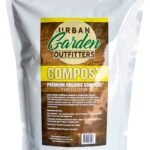What You’ll Learn: 11 Key Takeaways About What Is Organic Gardening
As an organic gardener, I know that creating a beautiful and healthy garden is no easy feat. It requires commitment, dedication, and a willingness to learn and adapt. But trust me, the rewards are worth it. A thriving organic garden can provide you with fresh produce, a beautiful outdoor space, and a deeper connection to nature. Whether you are a seasoned gardener or just starting out, these 11 key takeaways, to our organic gardening for beginners or mastering organic gardening, are sure to help you achieve your green paradise.
11 Key Takeaways: Organic Gardener Gardening Methods
1. Soil Health is Paramount
Organic gardening places a strong emphasis on soil health. Using organic matter like compost enriches the soil, providing essential nutrients for plants.
2. Chemical-Free Approach
One of the cornerstones of organic gardening is avoiding synthetic fertilizers and pesticides. This not only benefits the environment but also produces healthier produce.
3. Biodiversity is Key
Organic gardens often have a variety of plants, which helps to attract beneficial insects and promotes a balanced ecosystem.
4. Water Conservation
Organic gardening often employs techniques like mulching and drip irrigation to conserve water, which is both eco-friendly and cost-effective.
5. Pest Management
Instead of chemical pesticides, organic gardening uses natural methods like companion planting and introducing beneficial insects to control pests.
6. Crop Rotation
This practice involves changing the types of crops grown in a particular area each season, which helps to prevent soil depletion and reduces the risk of pest infestations.
7. Local and Seasonal Focus
Organic gardening encourages the cultivation of local and seasonal produce, reducing the carbon footprint associated with transporting food.
8. Sustainability
By using organic methods, gardeners contribute to sustainable agriculture, preserving the land for future generations.
9. Health Benefits
Organic gardening often results in fruits and vegetables that are higher in essential nutrients like vitamins and antioxidants, compared to conventionally grown produce. By avoiding synthetic pesticides and fertilizers, you reduce your exposure to harmful chemicals, which can have long-term health implications. Gardening is often cited as a form of therapy that can help reduce stress, anxiety, and depression. The act of nurturing plants and being in nature can have a calming effect on the mind.
10. Community Engagement
Organic gardening often fosters community engagement, whether it’s through local farmers’ markets or community gardens.
11. Economic Benefits
While the initial setup for an organic garden can be more expensive, the long-term costs are often lower due to reduced need for synthetic fertilizers and pesticides.
These takeaways can serve as a framework for a more in-depth article on the subject of organic gardening.

Why Choose Organic Vegetable Gardening?
As a gardener, I believe that choosing organic gardening over conventional methods is the best decision I have ever made. Not only does it benefit my health, but it also protects the environment and improves the quality of the produce I grow.
The use of synthetic fertilizers in conventional gardening can lead to detrimental effects on both our health and the environment. They contain harmful chemicals that can harm wildlife and contaminate our water sources. Vegetable Organic gardening, on the other hand, avoids the use of synthetic fertilizers and instead relies on natural methods to nourish plants and soil.
Read More OutdoorGoodness Articles:
- Discover Gardening Advice: 21 Gardening Tips for Beginners
- Different Types of Organic Composting Techniques
- Advanced Gardening: 23 Expert Tips for Improving Your Garden
- Wildlife Friendly Gardening: Help Your Local Little Buddies
- Gardening Charcoal: Enhancing Soil Health
- Adult Outdoor Activities: Fun Outdoor Activities for Adults
Organic gardening not only benefits the environment, but it also yields healthier and more flavorful produce. The use of organic methods like composting and crop rotation helps to enrich the soil, resulting in better nutrient content. Organic plants also have stronger immune systems due to the absence of synthetic pesticides and are more resistant to pests and diseases.
Choosing organic gardening is a small step towards a healthier and sustainable future. By committing to organic practices, we can create a safer and healthier environment for ourselves, our families, and future generations to come.

Creating Healthy Soil, Mulch and Compost
I believe creating healthy soil is one of the most essential aspects of successful organic gardening. By adding organic matter, such as compost, mulch, manure, and nitrogen, we can boost soil fertility and improve soil structure.
Add Organic Matter to Your Soil
Organic matter is key to healthy soil, and a good place to start is by adding compost. Compost is a form of organic matter that has been decomposed and recycled into a nutrient-rich soil amendment.
In addition to compost, you can add other forms of organic matter such as aged manure, leaves, and grass clippings. These materials break down over time and add valuable nutrients to the soil.
It’s important to note that adding too much of any one type of material can throw off the balance of your soil, so it’s best to mix different types of organic matter together.
Improve Soil Structure
Improving soil structure is another important aspect of healthy soil. Soil structure refers to the way soil particles clump together, and it affects the soil’s ability to hold water and nutrients.
One way to improve soil structure is by adding organic matter. The organic matter acts as a binding agent that holds soil particles together, creating larger aggregates and improving the soil’s porosity.
Another way to improve soil structure is by avoiding soil compaction. Compacted soil can lead to poor drainage and root growth, so it’s important to avoid walking on soil when it’s wet and to use raised beds or pathways to reduce soil compaction.
Test Your Soil for Nutrients
Testing your soil is an important step in understanding its nutrient content. Soil tests can tell you the pH level of your soil, as well as the levels of essential nutrients like nitrogen, phosphorus, and potassium.
If your soil is lacking in certain nutrients, you can add organic fertilizers like bone meal or blood meal to boost its nutrient content.
By creating healthy soil with organic matter, improving soil structure, and testing for nutrient content, we can lay the foundation for a successful organic garden.
Choosing Organic Seeds and Healthy Plants
When it comes to creating an amazing organic garden, the foundation lies in choosing organic seeds and healthy plants. Organic seeds are free from chemical treatments, genetically modified organisms, and synthetic pesticides.
By selecting organic seeds, you are ensuring the growth of plants that are robust, resilient, and better adapted to the natural environment. These seeds have the potential to produce vibrant, nutrient-rich vegetables, fruits, and herbs that are not only good for your health but also for the environment.
Equally important is the selection of healthy plants when starting your organic garden. Look for plants that have strong stems, lush foliage, and no signs of disease or pest damage. By starting with healthy plants, you are giving them a head start in establishing themselves in your garden and increasing your chances of a successful harvest.
Remember, organic seeds and healthy plants are your path to better resistance to pests and diseases and you have a higher likelihood of producing a bountiful yield.

Natural Pest Control
Pests can be a major challenge for any gardener, but when it comes to organic gardening, the use of synthetic pesticides is not an option. Instead, we rely on natural pest control methods to keep our gardens healthy and productive.
One of the most effective natural pest control methods is the use of beneficial insects. These insects feed on the pests that attack our plants, reducing their populations naturally. Some common beneficial insects include ladybugs, lacewings, and praying mantises. You can also attract beneficial insects to your garden by planting flowers that provide nectar and pollen.
If beneficial insects aren’t enough to control your pest problem, there are a variety of organic pesticides that you can use. These pesticides are made from natural substances and are less harmful to the environment than synthetic pesticides. Some common organic pesticides include neem oil, insecticidal soap, and pyrethrin.
It’s important to remember that even organic pesticides can have negative effects on beneficial insects and other organisms in your garden. Before using any pesticide, be sure to read the label carefully and follow all instructions.
By using natural pest control methods, we can maintain a healthy garden ecosystem without relying on harmful chemicals. With a little patience and persistence, you can keep your garden pest-free and thriving.
Weed Management
I understand the importance of keeping weeds under control without using harmful herbicides. One of the most effective ways to do this is by using mulch. Mulch not only prevents weeds from sprouting but also helps retain moisture and regulate soil temperature.
When using organic methods for weed management, it’s important to remember that prevention is key. Pulling weeds by hand, hoeing, and using a trowel are all organic methods of weed removal, but they can be time-consuming. That’s why I recommend using mulch to prevent weeds from growing in the first place.
Organic mulches such as straw, leaves, and grass clippings not only prevent weeds but also help build soil structure and add organic matter. I like to apply a layer of mulch a few inches thick around my plants, being careful not to cover the stems or trunks.
Another effective organic method for weed management is using cover crops. Cover crops such as clover, rye, and oats are planted in between growing seasons and plowed under before planting the next crop. These cover crops help improve soil health and suppress weed growth by outcompeting them for nutrients and space.
Overall, using organic methods for weed management is not only better for the environment but also helps maintain a healthy garden ecosystem. By using mulch and cover crops, and practicing preventive measures, we can keep our gardens weed-free without the use of harmful herbicides.

Crop Rotation for Success
I also understand the importance of crop rotation in maintaining a healthy and productive vegetable garden. Simply put, crop rotation is the practice of moving crops around the garden each year to avoid planting the same family of plants in the same spot, year after year.
The benefits of crop rotation are numerous. It prevents the build-up of pests and diseases that can happen when plants from the same family remain in the same spot. It also helps to balance soil fertility, as different crops have different nutrient requirements and leave behind different residues. Finally, crop rotation can improve the overall health and productivity of your organic garden, resulting in healthier plants and a higher yield.
Why Rotate Crops?
Rotating crops is essential for maintaining soil health and fertility. Different plants require different nutrients from the soil, and rotating crops ensures that nutrients are replenished and not depleted. It also helps to break pest and disease cycles by preventing them from becoming established in the soil.
Rotating crops also helps to prevent soil erosion, as different crops have different root depths and structures, which helps to improve soil structure and water retention. Additionally, it allows you to experiment with different crops and avoid boredom with the same crops year after year.
How to Rotate Crops
Rotating crops is easier than you might think. Start by dividing your garden into sections and rotating crops within each section. For example, if you have three sections, rotate your crops between those three sections each year, planting plants from different families in each section. Alternatively, you could divide your garden into four sections and rotate your crops each year, planting plants from different families in each section.
Another way to rotate crops is by following the three-year rule. This means not planting the same family of vegetables in the same spot for three years. For example, if you planted tomatoes in one spot this year, avoid planting tomatoes in that same spot for the next three years.
Lastly, don’t forget to add cover crops to your crop rotation plan. Cover crops should be planted in between your edible crops to help suppress weeds, add organic matter to the soil, and improve soil structure. Planting cover crops helps to protect and nourish the soil when it would otherwise be bare.
Conclusion
Rotating crops is a simple yet effective practice that can help you maximize the health and productivity of your organic garden. By rotating crops, you can prevent soil depletion, pest and disease build-up, and soil erosion. It also allows you to experiment with different crops and prevent boredom with the same crops year after year. So go ahead and give it a try – your plants will thank you for it!
Nutrient Management
One of the most important aspects of maintaining healthy plants is proper nutrient management. Rather than relying on synthetic fertilizers that can harm the soil and surrounding environment, organic fertilizers provide a sustainable solution.
Organic fertilizers are made from natural materials and are slow-release, providing a steady supply of nutrients to plants over time. They also improve soil health by promoting microbial activity, increasing soil organic matter content, and improving soil structure.
One of the best organic fertilizers is a compost pile, which can be made from kitchen scraps, yard waste, and other organic materials. Compost is rich in nutrients and can be added to garden beds throughout the growing season. Manure is another excellent organic fertilizer that is high in nitrogen. However, be sure to use well-aged manure to avoid burning plant roots.
When choosing a fertilizer, be sure to read the label and select one that is appropriate for the specific type of plants being grown. Different plants have different nutrient requirements, so it’s essential to choose a fertilizer that meets those needs.
In addition to using organic fertilizers, it’s also crucial to avoid synthetic fertilizers. Synthetic fertilizers are often made from non-renewable resources and can have negative impacts on the environment. They also deplete soil health by killing beneficial microorganisms and reducing soil organic matter content.
By embracing nutrient management techniques in organic gardening, you can create a sustainable and healthy garden that produces abundant, nutritious crops.

Successful Organic Pest Management
Managing pests organically is not only beneficial for the environment, but also for the health of your garden. Organic gardening methods can help attract beneficial insects and reduce the need for harmful pesticides. Here are some tips for successful organic pest management:
- Do your research: Learn about which pests are common in your area and how to identify them. This will help you determine the best approach for managing them organically.
- Use organic pesticides: There are many organic pesticides available that are derived from natural sources such as neem oil, pyrethrins, and diatomaceous earth. These can be effective in managing pests without harming the environment.
- Attract beneficial insects: Beneficial insects such as ladybugs, lacewings, and praying mantises can help control pest populations. Planting flowers and herbs such as marigolds, dill, and fennel can attract these helpful insects to your garden.
- Practice crop rotation: Rotating crops can help prevent the buildup of pest populations in your soil. This can also improve soil health and reduce the need for pesticides.
- Remove infected plants: If a plant is severely infected with pests, it may be best to remove it from your garden to prevent the spread of pests to other plants.
- Maintain garden hygiene: Keeping your garden clean and free of debris can help reduce the likelihood of pests taking up residence. Regularly cleaning up fallen leaves and fruits can prevent the buildup of pests.
By incorporating these organic pest management techniques into your gardening practices, you can create a healthy and thriving garden while also doing your part for the environment.
Maximizing Space with Raised Beds
One of the best things about organic gardening is the ability to grow your own food and create an oasis of green in your own backyard. To make the most of your space and increase productivity, consider using raised beds. These are essentially garden beds that are raised off the ground, usually a few inches to a foot or more, and offer several advantages:
- Raised beds are perfect for home gardeners with limited space. They allow you to grow more plants in a smaller area, making the most of limited space.
- They provide excellent drainage, which can be especially helpful in areas with heavy rainfall or poor soil drainage. Proper drainage is essential for healthy plant growth.
- Because raised beds are typically filled with garden soil, you can have better control over soil quality and fertility. You can choose to use organic soil, compost, and other soil amendments to give your plants the best start.
- You can customize the size, shape, and height of your raised beds to suit your specific needs and preferences. This makes them ideal for gardens of all sizes and shapes, from small urban balconies to large country estates.
In addition to these benefits, raised beds are also easier to work with than traditional garden beds. They require less bending and kneeling, making them a great option for older gardeners or those with physical limitations. They also make it easier to control weeds and pests, as you can focus your attention on a smaller area.
Overall, raised beds are a simple yet effective way to maximize space and productivity in your organic garden. Whether you’re a seasoned gardener or just getting started, consider incorporating raised beds into your gardening plan.
Importance of Soil Testing
As a dedicated home gardener, one of the most critical factors for success in organic gardening is healthy soil. Understanding what nutrients your plants need is crucial to achieving a bountiful harvest. If you are new to organic gardening, you might be wondering, “How do I know what nutrients my soil lacks?” The answer is simple: soil testing.
Soil testing is the process of examining the soil’s pH levels, nutrient levels, and organic matter content. By getting a soil test, you can learn a lot about the condition of your garden soil, and it can help you determine how to nourish your plants effectively. Soil tests can also help you avoid the pitfalls of overfertilizing or using the wrong type of fertilizer, which can harm your plants and the environment.
But how do you conduct a soil test? As a home gardener, you don’t need a degree in soil science to do it. Home soil testing kits are readily available at garden centers or online. With a home testing kit, you can take a sample of your garden soil and send it into a lab for analysis. Once you receive your results, you can adjust your soil’s pH levels and nutrient content with organic amendments such as compost, bone meal, or green manure.
Soil testing is a crucial step towards mastering organic gardening. It allows you to make informed decisions about your soil and ensures that your plants receive the nutrients they need to thrive. As a result, your garden will flourish, and you’ll enjoy a bountiful harvest of healthy, organic fruits and vegetables.
Embrace Gardening Organically Methods: Best Organic Gardening Practices
Start an organic garden. As a passionate organic gardener, I firmly believe that embracing organic methods is essential for creating a sustainable and healthy garden. By using the best seeds and practicing organic gardening techniques, we can not only produce healthy, nutritious food but also help protect our environment. Here are some tips to help you embrace organic methods in your gardening:
- Choose organic seeds: Start with the best seeds to ensure that your garden is free from genetically modified organisms (GMOs) and harmful chemicals. Look for suppliers that offer a wide variety of organic seeds for your favorite fruits and vegetables.
- Practice organic gardening techniques: Use natural methods to promote plant growth and reduce pests and diseases. Apply compost and organic matter to improve soil strength, and mulch around plants to conserve moisture and suppress weeds. Use crop rotation to prevent soil-borne diseases and pests, and attract beneficial insects to control harmful pests.
- Avoid synthetic fertilizers and pesticides: Chemical fertilizers and pesticides can harm your plants, soil, and the environment. Instead, use organic fertilizers and pesticides made from natural ingredients that are safe and effective.
- Use companion planting: Companion planting involves growing two or more plants together that have a beneficial relationship, such as repelling pests or enhancing soil durability. Research which plants work well together and try incorporating them into your garden.
- Support biodiversity: Encourage a diverse range of plant and animal life in your garden by providing habitats for beneficial insects, birds, and other wildlife. This will help maintain a healthy garden ecosystem and reduce the need for harmful pesticides.
By embracing organic methods in your gardening, you can play a role in promoting environmental sustainability while enjoying the health benefits of fresh, organic produce. Remember, every small step toward a more organic and sustainable garden can make a big difference.
Embrace Organic Methods Today
As you embark on your organic gardening journey, remember to embrace organic methods in all aspects of your gardening. Use organic seeds, avoid synthetic fertilizers and pesticides, and always strive to work in harmony with nature.
I hope this article has inspired you to take the first step towards creating your own green paradise. By incorporating these 11 tips and embracing organic methods, you too can enjoy the rewards of successful organic gardening.
Happy gardening!

Conclusion
Mastering organic gardening is not a difficult task. With the right knowledge and techniques, anyone can create a green paradise that is both beautiful and sustainable. Throughout this article, I have shared 11 valuable tips that can help you achieve success in organic gardening.
By choosing organic gardening, you are making a positive impact on your health, the environment, and the community. Not only are you avoiding harmful synthetic fertilizers and pesticides, but you are also promoting soil health and biodiversity.
Remember, healthy soil is the foundation of organic gardening. Take the time to add organic matter and compost, and consider using natural pest control methods to maintain a balanced ecosystem. Crop rotation, nutrient management, and raised beds are all effective techniques that can help you maximize your space and yield.
FAQ
Q: What is organic gardening?
A: Organic gardening is a method of growing plants without the use of synthetic fertilizers, pesticides, or genetically modified organisms (GMOs). It relies on natural processes and materials to nourish and protect plants, focusing on building healthy soil and promoting biodiversity.
Q: Why should I choose organic gardening?
A: Organic gardening offers numerous benefits. It promotes environmental sustainability by avoiding the use of harmful chemicals, reduces the risk of pesticide exposure in your home and garden, and produces healthier and more nutritious fruits, vegetables, and herbs. Additionally, organic gardening helps maintain natural ecosystems by supporting pollinators and beneficial insects.
Q: How can I create healthy soil for organic gardening?
A: Healthy soil is the foundation of successful organic gardening. You can enhance soil organics by adding organic matter such as compost, manure, and leaves. Nitrogen-rich materials like legume cover crops can also help improve soil structure and provide essential nutrients for plants.
Q: What are some natural methods for pest control in organic gardening?
A: Organic gardening relies on natural pest control methods. You can attract beneficial insects like ladybugs and lacewings that prey on pests, set up physical barriers like row covers, and use organic pesticides derived from plant-based ingredients.
Q: How can I manage weeds in organic gardening?
A: Organic weed management involves techniques like using mulch to suppress weed growth, hand-pulling weeds, and practicing proper crop rotation. Avoiding the use of herbicides ensures the health and sustainability of your organic garden.
Q: Why is crop rotation important in organic gardening?
A: Crop rotation helps prevent soil depletion and the buildup of pests and diseases. By rotating crops in different sections of your garden each year, you can improve soil health, control pests naturally, and optimize nutrient availability for different plant families.
Q: How do I effectively manage nutrients in organic gardening?
A: Organic nutrient management involves using organic fertilizers like compost, manure, and bone meal to nourish plants. These natural fertilizers release nutrients slowly, providing long-term benefits to your garden without the risk of nutrient runoff.
Q: What are the key elements of successful organic pest management?
A: Successful organic pest management involves a combination of strategies. It includes using organic pesticides selectively, attracting beneficial insects through companion planting, and maintaining a diverse and balanced garden ecosystem.
Q: How can raised beds maximize space in organic gardening?
A: Raised beds are ideal for home gardeners, as they allow for efficient use of space and provide better control over soil quality. You can build raised beds using various materials and fill them with nutrient-rich organic soil, providing optimal growing conditions for your plants.
Q: Why is soil testing important in organic gardening?
A: Soil testing helps you understand the nutrient content and pH level of your soil. This information allows you to make informed decisions about fertilizer application and soil amendments, ensuring that your plants receive the right balance of nutrients for healthy growth.
Q: How can I embrace organic methods in gardening?
A: Embracing organic methods means using organic seeds, following organic gardening practices, and avoiding the use of synthetic fertilizers and pesticides. By doing so, you can contribute to a healthier and more sustainable environment while enjoying the rewards of growing your own organic produce.
NC State: Organic Gardening Handbook

Meet Kevin Goodell, your outdoor adventure coach! With a passion for nature ignited in childhood, Kevin brings a wealth of experience and expertise to simplify tough outdoor skills. As a U.S. Army veteran and former Sergeant, he has honed his leadership and teamwork abilities while developing a deep love for the great outdoors.
Kevin’s dedication to outdoor activities spans biking, birdwatching, national park trips, and archery/golf. With his friendly and approachable demeanor, he is committed to guiding individuals of all ages and skill levels towards unforgettable outdoor experiences.
Harnessing his extensive knowledge and personal achievements, Kevin is your go-to resource for learning and enjoying various outdoor pursuits. Whether you seek thrilling adventures or serene nature escapes, Kevin’s professional yet friendly approach will ensure an engaging and informative experience. Embark on your next outdoor adventure with Kevin Goodell and embrace the beauty of nature like never before.






